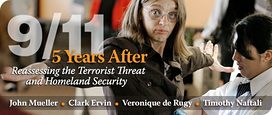At the core of this debate is a disagreement over the operational consequences of misunderstanding the threat. Clark Ervin employs the analogy of the Cold War and of personal faith to argue that these consequences are not significant enough, comparatively speaking, to weigh against accepting an expansive view of the terrorist challenge.
I take a different lesson from the Cold War (and leave personal faith to a different blog). With the possible exception of in 1945-48 and 1978-1979, the United States systematically overestimated the actual threat posed by the Soviet Union. Largely making the same argument as Clark Ervin, many U.S. policymakers pushed for defense budgets and a level of domestic fear that in retrospect appears not only unnecessary, but may have also contributed to the prolongation of the Cold War. The argument went like this: the Soviets are bad, have WMD and want world domination; therefore we must assume that we face annihilation and anyone who argues otherwise is irresponsible or worse. It is no accident that two of the proponents of the current war in Iraq and of the imperial presidency, Vice President Dick Cheney and Secretary of Defense Donald Rumsfeld, were among the most vociferous defenders of the view in the 1980s that the Soviets were 12 feet tall and working to launch a first-strike on the U.S. Instead, the USSR was on the verge of collapse.
My point is that our system rarely offers up precise threat assessments. We either see a threat as all-encompassing or we tend to ignore it. What I read (and agreed with) in both Veronique de Rugy and John Mueller’s pieces was a plea for a more realistic assessment of the current threat and, accordingly, a smarter response. We all believe Al Qaeda is dangerous and that the terrorist threat extends beyond bin Laden’s group. Patriotic chest-thumping, however, is of little help when the problem is the recruitment of new operatives and suicide bombers. Can we somehow deter these recruitments? Are our military actions counterproductive in the political struggle for these people? By making bin Laden the focus of our public efforts are we not helping him stay visible and symbolic? We have already seen some of the costs of the overreaction. Leaving aside the hard question of whether the Iraq war in any way triggered the attacks in London last year, there can be no doubt that the U.S. government’s credibility with the American people has yet to recover from the WMD war propaganda before the invasion of Baghdad.

